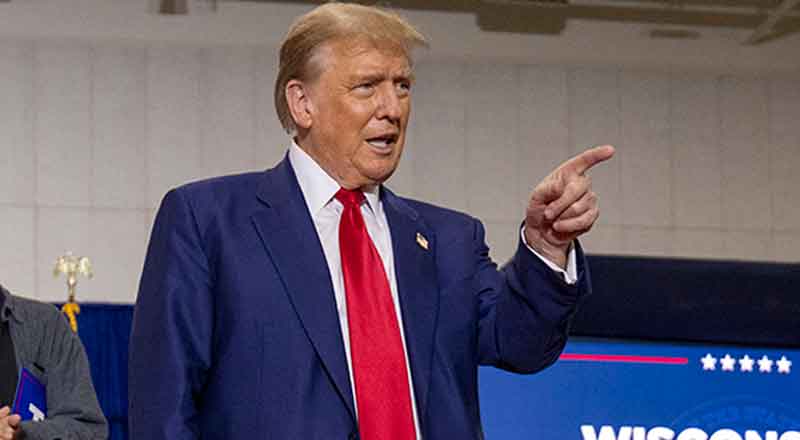Felony convictions carry profound implications, altering an individual’s rights, responsibilities, and public perception. The case of Donald Trump, the first U.S. president-elect to assume office with a felony conviction, has sparked widespread attention due to its unprecedented nature and the complex legal and civic questions it raises. Trump’s conviction stems from falsifying business records related to a hush money payment to adult film actress Stormy Daniels during the 2016 presidential campaign. While he avoided jail time or fines, the legal and practical consequences of his conviction remain significant.
Can Trump Still Hold Office?
One of the most pressing questions is whether Trump’s felony conviction disqualifies him from serving as president. Under federal law, individuals with felony convictions are not barred from holding the presidency. This ensures Trump’s eligibility to take office remains intact.
However, the same is not true for state or local positions, which often impose stricter requirements. In some cases, a pardon or expungement may be necessary for eligibility. Trump retains the ability to issue federal pardons once in office, but state-level convictions, like his own, fall under the jurisdiction of the respective state’s governor.
New York Governor Kathy Hochul, a Democrat, has signaled that evidence of remorse would be necessary for a pardon—a condition Trump has not met, as he continues to dismiss the case as a politically motivated “hoax.”
Impacts on Rights and Obligations
Trump’s felony conviction has several legal and civic implications, though not all affect him equally. Key changes include:
Voting Rights
Trump remains eligible to vote in Florida, where he is registered. Florida law restores voting rights to felons after they complete their sentences, except for those convicted of murder or sex offenses. In New York, where Trump was convicted, voting rights are restored upon release from incarceration. Since his sentence involved no jail time, his voting rights remain unaffected.
Firearm Ownership
Under federal law, felons are prohibited from owning firearms. This restriction applies nationwide, barring Trump from legally possessing guns.
DNA Sampling
New York law requires all individuals convicted of felonies to provide a DNA sample for the state’s crime databank. This involves a simple cheek swab, analyzed and stored in databases connected to the FBI’s Combined DNA Index System.
How Does This Affect Trump’s Travel and Business?
Felony convictions often bring complications in areas such as international travel and business activities, which could affect Trump personally and professionally.
Travel Abroad
As president, Trump will retain a diplomatic passport, granting him ease of travel for official duties. However, some countries, including Canada, the United Kingdom, and Israel, have strict entry requirements for individuals with felony convictions. While exceptions may be made for a sitting president, his conviction could still pose challenges for diplomatic visits to nations with stringent policies.
Business Operations
Trump’s conviction could limit his ability to hold certain business licenses. For instance:
Liquor Licenses: States like New Jersey prohibit individuals convicted of crimes involving “moral turpitude” from obtaining these permits. While Trump’s businesses are operated through corporate entities, insulating them from direct impact, such restrictions remain noteworthy.
Casino Industry: Gaming licenses typically exclude individuals with criminal records. Although Trump no longer owns casinos, his felony status could prevent any future involvement in this sector.
Legal Battles and Potential Appeals
Trump’s legal team has announced plans to appeal the conviction, alleging procedural errors during the trial. The appellate process focuses on legal interpretations rather than questions of guilt, and it is expected to extend well into his presidency.
If successful, an overturned conviction would erase the felonies from Trump’s record. However, appeals are often lengthy, and legal experts suggest they are unlikely to interrupt Trump’s presidential term.
The Broader Implications
Donald Trump’s felony conviction underscores the complexities of balancing legal accountability with constitutional governance. While his conviction introduces legal and civic constraints, it does not disqualify him from the presidency. The case also sheds light on the broader challenges associated with integrating legal justice and executive authority.
As Trump continues to appeal the verdict, the unprecedented nature of his situation invites reflection on how the U.S. legal and political systems navigate such historic challenges. Whether the conviction ultimately affects Trump’s presidency remains to be seen, but its impact on public discourse and the perception of justice is undeniable.
Trump’s felony conviction serves as a reminder of the intersection between legal accountability and political leadership. While he retains key rights, including the ability to hold office and vote, his legal status introduces significant limitations and raises questions about broader implications for governance and the rule of law.
This case sets a historic precedent, demonstrating the complexities of applying legal principles to individuals in positions of extraordinary power. As the legal battles continue, the world watches closely, reflecting on the enduring principles of justice, democracy, and leadership.
(With inputs from agencies)





